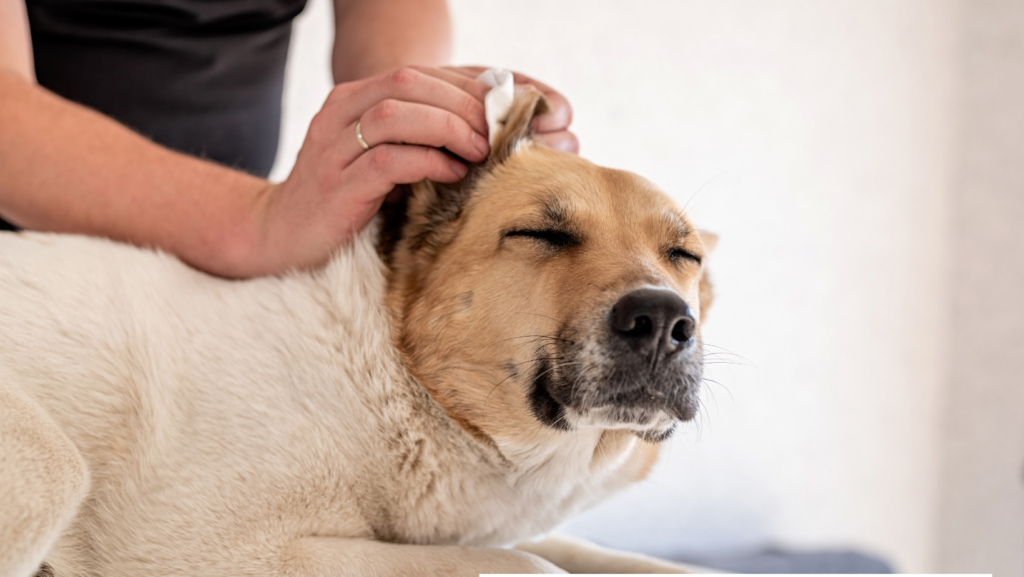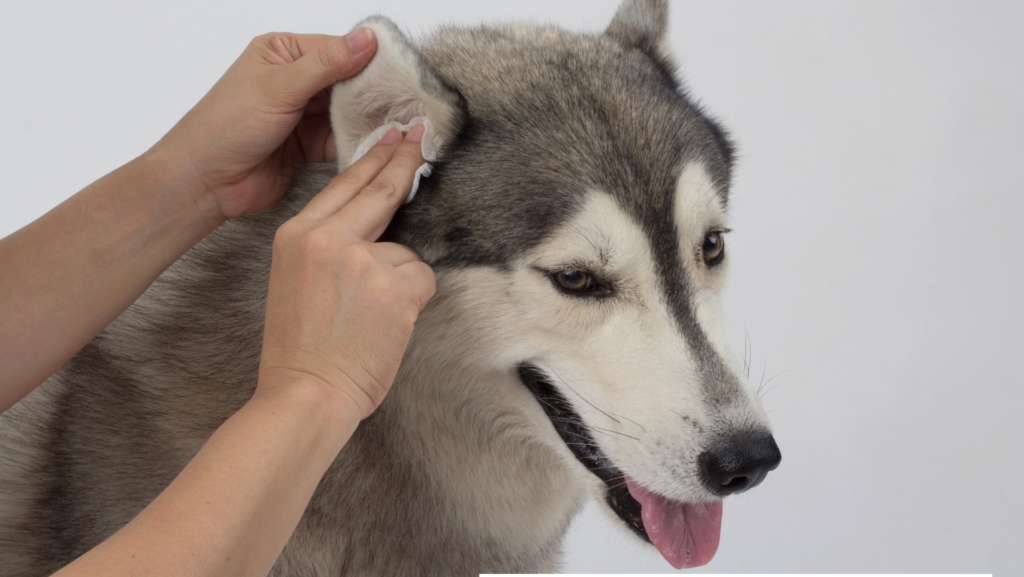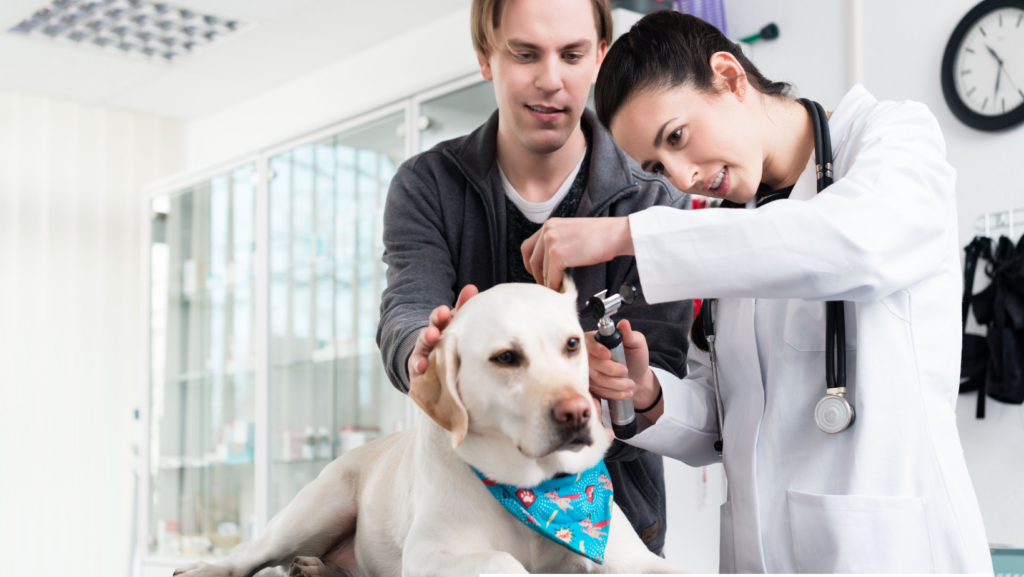Dogs occasionally display many new behaviors, leaving you amused and sometimes worried. I bumped into a friend the other day who expressed concern about her dog shaking his head too often of late. That could be worrisome, especially if the dog does the same quite often. Have you faced such an experience with your dog too?
Read on to know the reasons why your dog keeps shaking his head. Also, know about all that you can do under such circumstances.
What if Your Dog is Shaking Their Head a Lot? 7 Possible Reasons

Is your dog shaking its head a lot? One of the reasons why your dog is shaking his head too much is to take off something that went inside his ears. If that’s the case, it may not be something to be worried about since your dog will do it only occasionally.
However, if shaking of the head becomes a habit, and you see your dog doing the same regularly, it might be a little serious. The reason could be an ear infection, for example. Read on to know more.
1. Something Has Gotten Into His Ears
If your dog has foreign objects inside his ears, like pieces of grass, an insect, or water, he will shake his ears vigorously to get them out. If the object hasn’t gone deep enough, it’ll come out when your dog shakes hard. Breeds with a drop or floppy ears are at an increased risk of having any foreign object stuck inside their ears.
If it is lodged deep within, your dog will need help to get that thing out of his ears. It’s always safe to seek a vet’s advice. He has advanced tools and adequate knowledge and can remove objects safely.
2. There’s Water in His Ears

Certain breeds, like the Golden Retriever, Poodle, and Labrador and the Retriever are fond of swimming. Alongside the fun, there are chances of water getting into your dog’s ears.
The same could happen during bathing, particularly if you pour water directly on your dog’s head. So when the water enters your dog’s ears, he will tilt and shake his head. He will also paw at his ears and rub them against the floor or furniture.
Your dog will even show other signs of distress. These include pacing up and down, moving in circles, and barking or whining increasingly.
3. He Has aN Itchy Ear (From Infections or Allergies)
What’s the best way to find relief from an itchy ear? It’s by scratching the ears, right? Dogs will do the same when they have itchy ears. They’ll scratch them using their paws and even shake their head.
Now, let’s get to what causes itchy ears in dogs. It could be ear mites which are small parasites, mostly affecting the dog’s external ear canal.
When your dog is affected by ear mites, he will shake his head and even scratch his ears. It may even lead to wax buildup and irritation of the ears, causing inflammation and redness. You could identify an ear infection in your dog at home. You would need to raise your canine’s ear flap. If you see discharge, swelling, or redness, it’s likely to be an infection.
A food allergy is another reason for itchy ears in dogs. When your canine is allergic to a certain food, paws and ears will itch the most. Your dog will express its discomfort by shaking its head as well.
He might have gastrointestinal issues that will result in diarrhea and vomiting. In addition to these, your dogs will display other symptoms like weight loss, hyperactive behavior, lessened energy, and aggressive tendencies. So, when you spot such signs in your dog alongside itchy ears and head shaking, testing for allergy is the need of the hour.
4. There’s Wax In His Ears

It’s normal for a dog’s ears to produce wax like humans. However, when your dog’s ears aren’t cleaned properly or if his ears have been affected by allergies, ear mites, fungal infections, and bacterial infections, it can cause the ears to produce an increased amount of wax. When your dog has ear wax, he will shake his head and paw at his ears to express his discomfort.
You could detect an ear wax buildup at home. Pull his ears gently. If you see a pink and clear ear canal, that’s fine. However, if you find the inside of your dog’s ears red and swollen with a smelly discharge, it’s a sign of an ear infection from increased wax buildup. You need to contact a vet at once.
5. Neurological Disorder
Head shaking in dogs might be related to a more serious neurological disorder. Other associated symptoms include uncoordinated movement, difficulty walking, seizures, trembling, twitching, and so on.
One of the neurological conditions that your dog is likely to suffer from is cerebellar hypoplasia. In this condition, the cerebellum doesn’t develop adequately. Besides head-shaking, other symptoms include uncoordinated movements and tremors.
6. He May Have Some Discomfort In His Mouth

If your dog has discomfort in his mouth, he may shake his head from one side to the other. Perhaps he has had a distasteful medicine or inhaled something he shouldn’t.
One extremely difficult situation which can cause major discomfort in their mouth is when they have come in contact with a toad’s poison. In such cases, dogs will also show other symptoms besides shaking their heads vigorously. These include increased drooling, pawing their mouth too often, increased vocalization, and foamy salivation. If this is the case, your dog must be taken to the vet immediately.
7. Tumors in the Ear Canal
If your dog has an abnormal growth in his ear canal, it is possibly a tumor. Your dog will have an itchy, inflamed, and painful ear. They may even shake their head often because of the pain and irritation.
There’ll also be a constant discharge of pus or blood. If the infection has spread to the middle or inner ear, your dog will lose coordination or balance and may even tilt its head often. In severe cases, it may even result in hearing loss and facial paralysis.
How to Stop Your Dog From Shaking His Head? 3 Probable Solutions
The only way in which you can stop your dog from shaking his head is by eliminating the triggers that have led to this condition. Let’s take a look at the ways how you can stop your dog from shaking his head?
1. Make Sure That Water Doesn’t Get Into Their Ears

To prevent water from getting into your dog’s ears, plug cotton balls into their ears when bathing or swimming. Half a cotton ball would be fine if it’s a small breed. If your dog doesn’t keep cotton balls in his ears, cleaning his ears right after swimming using a vet-approved solution would help keep his ears clean. The use of an ear band would be a good idea as well.
While bathing your dog, never pour water on his head directly. In this way, a lot of water can get inside his ears. Instead, start bathing from its neck and then proceed downwards. Wipe its face and ears using a moist washcloth.
2. Clean Your Dog’s Ears Well
It is always important to clean your dog’s ears once a week using a moist cotton ball dipped in a vet-approved solution. Also, check its ears for any infection, redness, and inflammation. It will help minimize the chances of an ear infection in the future.
Dogs with floppy or hanging ears, like the Cocker Spaniel, Beagle, and Basset Hound, are more prone to ear infections than others. So, if you have dogs with floppy ears, take extra care in cleaning their ears.
3. Talk To A Vet

When you have identified that a foreign object is stuck inside your dog’s ear, never try to dislodge it at home. You may end up hurting your dog or causing more damage. Take him to the vet immediately, who can take the foreign object out using advanced equipment.
In case of ear pain, if you find your dog showing signs of discomfort, being lethargic, tilting his head to one side, and shaking his head too often, you need to speak to a vet at once.
Is a “Head Shake” Different From a “Shake Off”?
Yes, a head shake and a shake-off are two different things. In a head shake, the dog will shake its head from one side to the other.
In case of a shake-off, they’ll not just shake their head but their entire body. According to dog experts, canines will shake off to calm themselves when stressed.
This behavior (shake-off) is also seen in dogs when they meet their mates for the first time. It’s a welcome gesture, besides their customary sniffing.
After your dog has been exhausted because of a rigorous play session or a tiring day out, you’ll see him shaking from head to tail. That’s his way of saying, ‘I’m done for the day.
FAQ’s
Ans: If your dog shakes his head persistently and shows other symptoms of discomfort which hampers his daily life, a vet’s consultation is needed at the earliest.
Ans: If your dog shakes his head and scratches its ears simultaneously, it may mean something has gotten inside his ears. It may even mean that his ears have become infected. It would help to immediately take your dog to the vet so the symptoms don’t aggravate.
Conclusion
If your dog shakes his head occasionally, it shouldn’t be a cause for concern. However, when it becomes repetitive, and other red flags show that all isn’t well, you should take him to the vet. The sooner the problem gets addressed, the better it will be for your dog.
Meet Fabian Wright, our guide into the animal realm at PetLoversArena.com. Having served as an Animal Care Specialist for the Ruwenzori Team at the Kansas City Zoo, he prioritizes conserving exotic species by replicating their habitats. Fabian aspires to share captivating stories of creatures, big and small, through PetLoversArena.com.

